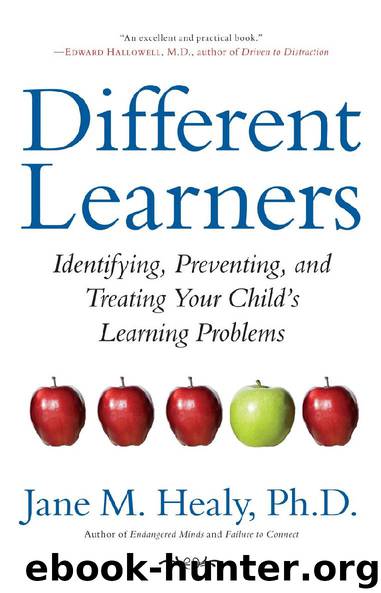Different Learners by Jane M. Healy Ph.D

Author:Jane M. Healy, Ph.D.
Language: eng
Format: epub
Publisher: Simon & Schuster Paperbacks
Published: 2010-07-15T00:00:00+00:00
“Inherited” Characteristics
With compelling evidence that some traits are passed down through families, researchers are zeroing in on those that seem to be most heritable. Two of the most frequently mentioned categories are temperament, or personality, and intelligence.
Personality and Temperament
In study after study, personality traits, or temperament, come up as some of our most “heritable” characteristics. Certain genes have been associated with tendencies toward stress, depression, or fearfulness on one hand, and impulsivity, aggression, social problems, and risk-taking on the other. Three examples of strongly heritable traits are novelty-seeking (risk-taking, extroversion, impulsivity), harm avoidance (fearfulness, stress response, depression, introversion), and reward dependence (persistence, attachment to others, sentimentality, warmth). 22
Please note that these are not descriptions of whole people; they are simply characteristics that may be found in various mixtures in each individual. Since a number of individual genes doubtless contribute to each trait, these temperaments may look quite different in different people. Although we don’t usually associate “personality” or “temperament” with learning problems, temperament actually has a close—and possibly even causal—relationship to some types of difficulties.
Novelty-Seeking. If you frequently find your toddler perched on top of the refrigerator or are a veteran of the local emergency room, you may have a child with a tendency to be a risk taker or “novelty-seeker.” He may also be an impulsive or extroverted child who has no problem approaching others and will join easily in group play or new situations—and sometimes, in his bumptious enthusiasm, offend other children without meaning to. He may also seek diversions when schoolwork seems “boring” and may be labeled attention deficit disordered. Researchers use the term disinhibition to describe such behavior. In some circumstances, this child may be at extra risk for what are called externalizing problems, such as conduct disorders.
Harm Avoidance. When Raina was not quite three, her mother enrolled her in a parent-child program of playing together with large-muscle activities and exercises. But Raina had her own ideas about participation. To her mother’s acute embarrassment, Raina—who had been a very late walker—sat solidly in Mom’s lap, and, refusing to budge, watched the others play. Although she eventually became a fine athlete and was happy to participate in team activities with her friends, Raina remained “shy,” finding it more comfortable to be an observer rather than joining in with strangers. This type of “harm avoidant,” “inhibited,” or “introverted” personality may also make a person fearful and more prone to stress or depression. Nonetheless, many adults with these characteristics put in extra effort to become socially adept and outgoing and learn to manage their own moods successfully.
Raina’s mother says she grew accustomed to report cards that read: “Raina seems to know the material, but she never volunteers in class. She needs to participate more actively.”
If a child like Raina also has an expressive language disorder that makes it difficult for her to express her ideas in words even in comfortable situations, this treatable problem may go undetected because everyone simply blames it on being “shy.”
Reward Dependence. “Will you be
Download
This site does not store any files on its server. We only index and link to content provided by other sites. Please contact the content providers to delete copyright contents if any and email us, we'll remove relevant links or contents immediately.
| Behavioral Disorders | Communicative Disorders |
| Gifted Students | Inclusive Education |
| Learning Disabled | Mentally Disabled |
| Physically Disabled |
The Art of Coaching Workbook by Elena Aguilar(51160)
Trainspotting by Irvine Welsh(21638)
Twilight of the Idols With the Antichrist and Ecce Homo by Friedrich Nietzsche(18620)
Fangirl by Rainbow Rowell(9228)
Periodization Training for Sports by Tudor Bompa(8252)
Change Your Questions, Change Your Life by Marilee Adams(7758)
This Is How You Lose Her by Junot Diaz(6877)
Asking the Right Questions: A Guide to Critical Thinking by M. Neil Browne & Stuart M. Keeley(5757)
Grit by Angela Duckworth(5604)
Red Sparrow by Jason Matthews(5465)
Paper Towns by Green John(5177)
Room 212 by Kate Stewart(5105)
Ken Follett - World without end by Ken Follett(4722)
Housekeeping by Marilynne Robinson(4436)
The Sports Rules Book by Human Kinetics(4379)
Papillon (English) by Henri Charrière(4262)
Double Down (Diary of a Wimpy Kid Book 11) by Jeff Kinney(4261)
The Motorcycle Diaries by Ernesto Che Guevara(4089)
Exercise Technique Manual for Resistance Training by National Strength & Conditioning Association(4060)
